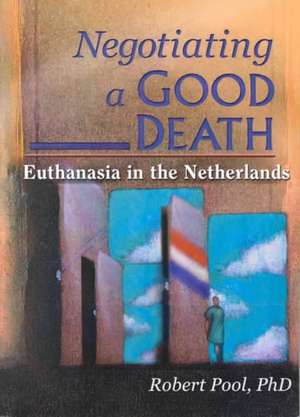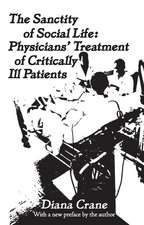Negotiating a Good Death: Euthanasia in the Netherlands
Autor Carlton Muson, Joan K Perryen Limba Engleză Paperback – 16 oct 2000
During the last ten years there has been much international interest in euthanasia in the Netherlands. In the discussion of euthanasia in the US and the UK, both sides in the debate continually refer to the “Dutch Experience”.
Negotiating a Good Death: Euthanasia in the Netherlands presents firsthand descriptions of euthanasia in practice in the Netherlands--something that has never been done before. This will provide a deeper understanding of the issues involved for all those interested in end-of-life decisions. It will also help clinicians and other medical professionals better understand end-of-life decision making.
Negotiating a Good Death is the first inside account of how decisions about euthanasia are made in real-life situations. Documenting two years of observations at a Dutch hospital, this valuable book describes why patients request euthanasia, the social factors that influence doctors’decisions about granting patients’requests, and how patients and doctors confer over peaceful deaths.
Some aspects of this delicate, often hidden, and socially taboo subject that Negotiating a Good Death frankly discusses are:
- the emotions that lead to a wish for death
- the ideology of easy death
- the anthropology of death
- the role of the researcher
- the line between symptom alleviation and euthanasia
- where the responsibility lies
- conservative options for medical personnel
- how to speak to relatives of someone who has requested euthanasia
- euthanasia as a cultural construct
Preț: 330.94 lei
Preț vechi: 424.91 lei
-22% Nou
Puncte Express: 496
Preț estimativ în valută:
63.32€ • 66.30$ • 52.52£
63.32€ • 66.30$ • 52.52£
Carte tipărită la comandă
Livrare economică 10-24 aprilie
Preluare comenzi: 021 569.72.76
Specificații
ISBN-13: 9780789010810
ISBN-10: 078901081X
Pagini: 272
Dimensiuni: 148 x 210 x 20 mm
Greutate: 0.41 kg
Ediția:1
Editura: Taylor & Francis
Colecția Routledge
Locul publicării:Oxford, United Kingdom
ISBN-10: 078901081X
Pagini: 272
Dimensiuni: 148 x 210 x 20 mm
Greutate: 0.41 kg
Ediția:1
Editura: Taylor & Francis
Colecția Routledge
Locul publicării:Oxford, United Kingdom
Cuprins
Contents
- Preface. Euthanasia in the Netherlands: Twenty-Five Years of Debate
- The Present Study
- Acknowledgments
- Chapter 1. Death and the Anthropologist: On the Problem of Studying Euthanasia
- The End: The Death of David
- Emotion and the Anthropology of Death
- Participant Observation
- Performative Ethnography
- Chapter 2. Euthanasia According to the Rules
- The Endoscopy Room
- The Attending Physician
- Mrs. Kees
- The Son
- The Psychologist
- The Second Opinion
- Dr. Van Ham
- The Head Nurse
- The Daughter
- Euthanasia
- The Coroner
- The Anesthetist
- The Euthanasia Request
- The Participants
- Did She Really Want to Die?
- The Rules of Due Care
- On the Role of the Researcher Once More
- Chapter 3. Where the Responsibility Lies
- Mrs. Van Nelle
- She Wants Euthanasia, but She is Afraid to Take the Responsibility
- Increasing the Morphine
- Was She Suffering Unbearably?
- Did She Really Want to Die?
- Dr. Glas's Intention
- Assuming Responsibility
- Chapter 4. The Line Between Euthanasia and Symptom Alleviation
- Mr. Strasser's Denial
- The Reversal
- Gerrit Knol's Interpretation
- Dr. Schuyt's Interpretation
- Was It Euthanasia or Just Symptom Alleviation?
- Chapter 5. Coping with Pressure from the Family
- Mrs. Lanser
- Mrs. Jones
- The Euthanasia Requests, the Relatives, and the Conservative Option
- Chapter 6. A Reflexive Intermezzo
- Dialogue
- The Doctors' Discussion
- Themes
- Chapter 7. Turning off Mr. Joost's Respirator
- Amyotrophic Lateral Sclerosis
- The Joost Family
- Shifting the Boundary
- Turning Off the Respirator
- What the Nurses Said, and What They Meant
- Doubt, Uncertainty, and Hesitation
- Chapter 8. When Doctors Refuse a Euthanasia Request
- Mr. Oosten's Euthanasia Request
- Mr. Oosten's Death
- The Nursing Records
- The Doctors' Interpretations
- When Is Euthanasia Negotiable?
- Euthanasia and Alleviation
- Chapter 9. The Negotiation Process
- Prerounds Discussion on the AIDS Ward
- Background of the Euthanasia Request
- The Request
- Bryan Mayflower
- The Request Considered
- Preparations
- The Mystery
- Dr. Edelman and the AIDS Patients
- Was It the Right Decision?
- Chapter 10. Unreported Euthanasia
- Uncle Max's Story
- Increasing the Morphine
- Euthanasia
- Where Was the Specialist? Dr. Schuyt's Explanation
- The Reason Why
- Chapter 11. The Social Context of Euthanasia
- The Patients
- The Relatives
- The Ideology of Easy Death
- Control and the Negotiation of a Good Death
- The Doctors
- The Nurses
- The Culture of the Ward
- Language, Discouse, and Communication
- Chapter 12. What is Euthanasia?
- Euthanasia and Assisted Suicide
- Euthanasia and Symptom Alleviation
- Euthanasia and the Withdrawal or Nonimplementation of Life-Prolonging Treatment
- Euthanasia As Cultural Construct
- Appendix. Euthanasia Declaration
- Notes
- References
- Index
Descriere
For social scientists, health professionals, and lay readers, Negotiating a Good Death: Euthanasia in the Netherlands is the first inside account of how decisions about euthanasia are made in real-life situations. Documenting two years of observations at a Dutch hospital, this valuable book describes why patients request euthanasia, the social factors that influence doctors' decisions about granting patients' requests, and how patients and doctors confer over peaceful deaths. Through case studies and examples, Negotiating a Good Death will help you understand the issues surrounding euthanasia and how life-ending decisions are made by both doctors and patients.
To view an excerpt online, find the book in our QuickSearch catalog at www.HaworthPress.com.
To view an excerpt online, find the book in our QuickSearch catalog at www.HaworthPress.com.











